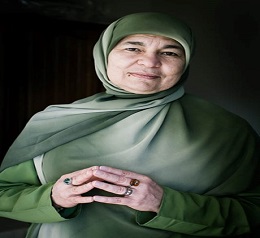4th Global
Women’s Empowerment & Leadership Summit
THEME: "Break Barriers, Build Futures"
 27-28 Oct 2025
27-28 Oct 2025  Bali, Indonesia
Bali, Indonesia THEME: "Break Barriers, Build Futures"
 27-28 Oct 2025
27-28 Oct 2025  Bali, Indonesia
Bali, Indonesia 
Muslim Women Australia, Australia
Title: Faith as a Tool for Empowerment: Intersectionality, Women’s Well-being, and Trust in DFV Support
Maha Krayem Abdo OAM isa passionate advocate for social justice and serves as the CEO of Muslim WomenAustralia (MWA). Under Maha’s leadership, MWA provides advocacy, policyadvice, community development and domestic violence support for women andchildren for women from diverse cultural and religious backgrounds.
Maha knows the migrantexperience firsthand having moved from Lebanon to Australia with her family inthe 1960s. Maha’s work has helped provide new arrivals and other womenwith safety and assurance. She also works at a local, national and internationallevel to advise governments on policy, services and strategies for Muslim andnon-Muslim women.
A trained socialworker, Maha’s contributions to human rights, equality and communitycohesion have been recognised through numerous awards.
This presentation explores the role of faith as a toolfor empowerment in the context of women experiencing violence, emphasizing theintersectionality of faith, well-being, trust, and community-centred support.It examines how Muslim women’s leadership in the domestic and family violence(DFV) sector is deeply rooted in their faith, cultural identity, and livedexperiences, shaping holistic, survivor-centred responses.
Using the case study of Muslim Women Australia, anorganisation that has been established for over 40 years, and its DFV service,Linking Hearts, this presentation highlights how faith-informed practicesprovide agency, dignity, and culturally responsive support. It underscores thesignificance of trust in service delivery—particularly for women from culturallyand linguistically diverse (CALD) backgrounds—who often seek safety and healingwithin community-led, faith-sensitive spaces. Despite structural barriers andpolicy shifts prioritizing generalist DFV service models, Muslim WomenAustralia has maintained a commitment to faith-based, culturally competentcare, demonstrating the necessity of services that foster well-being byaddressing the spiritual, psychological, and social dimensions of healing.
Drawing on victim-survivor experiences as well asorganisational experiences, this presentation argues that faith is not only asource of resilience but also a critical framework for advocacy,trust-building, and systemic change in DFV response services. It calls forgreater recognition of authentic community-centred approaches in the DFV sectorto ensure holistic and meaningful support that strengthens both individuals andcommunities.